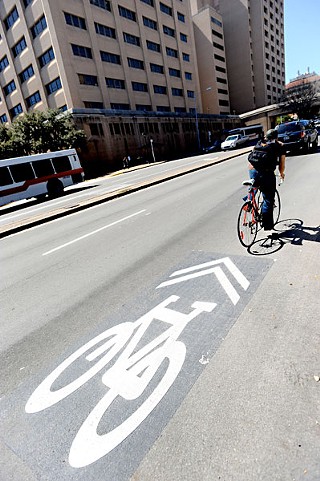Then There's This: Honk If You Prefer Walking
Young people are changing transportation trends as city rushes to catch up
By Amy Smith, Fri., May 24, 2013

If the American driving boom is indeed dead, as the authors of a new research study declared last week, you wouldn't know it by looking out the Chronicle office windows each weekday evening and seeing the endless crawl and stall on the upper and lower decks of I-35. And you wouldn't know it by the crowded, beaten-down thoroughfares across the city, or, for that matter, by the residential neighborhoods that increasingly serve as shortcuts for drivers. (Humble personal apologies to Dawson neighborhood residents.)
But according to a new report from the U.S. Public Interest Research Group Education Fund, a nonprofit consumer advocacy group, young people – identified as millennials born between 1983 and 2000 – are leading the transportation trend away from automobiles. If they continue to drive less as they grow older, and if future generations stay on course, we could see only a 7% increase by 2040, the findings show.
The researchers, who make no bones about their preference for multi-modal transit options, argue that now's the time to seriously rethink transportation policies, instead of relying on outdated forecasts to justify dumping billions of dollars into new highways and toll roads "even as [repairs to] existing roads and bridges are neglected."
"America's transportation leaders need to wake up to the momentous changes that have taken place over the last decade," said one of the report's authors, Phineas Baxandall, in a statement released with the findings. "The infrastructure we build today will mainly be used and paid for by the millennials who are leading the trend away from driving."
Predictably, the report has drawn criticism from skeptics who either dismiss the findings outright or suggest that the trend will reverse itself once the millennials start to marry, have children, and move further outside cities, where housing is generally more affordable. Locally, the report followed an altogether different study from INRIX, a traffic research firm based in Washington state, which designated Austin as the fourth worst congested city in the U.S.
While INRIX looks at real-time traffic data, the PIRG researchers reviewed the average number of miles driven in the U.S. and concluded that Americans drive fewer total miles today than eight years ago. Young people between the ages 16 and 34 drove on average 23% fewer miles in 2009 than in 2001, the report states, noting that the recession likely contributed to that decline. At the same time, Austin and other cities are shifting land-use policies to promote more urban density, bike lanes, and walkable neighborhoods, resulting in healthier lifestyles, less reliance on automobiles, oil, and, of course, lower levels of carbon dioxide emissions.
Slowing the Pace
East Coast transplant Patrick Marshall is a member of this generation, and says he has no interest in driving. Living in Boston and New York, he could easily get around. Austin presents more of a challenge, but he's managed to make do with his bike and his two feet in the two-and-a-half years he's lived here. "When I came here it didn't cross my mind to get a car," he says. The 29-year-old typically bikes from his home in East Austin to his South Congress job at Perla's Restaurant, where he works as an expediter, organizing food orders from the kitchen.
"Getting around town really isn't all that difficult," Marshall says. "It's like anything else – things that are perceived as necessities really aren't neccessities, they're wants. And with more housing built in the central area, more and more people are able to just walk out their door and experience the world." While some car-free people he knows don't have the means to buy a car, there are others who make a conscious decision not to drive. Marshall falls into the latter category, favoring the principles of the "slow movement," which promotes tapping the brakes on a fast-paced world. Biking or walking is really the best way to do that, he says. "I always enjoy it because you move through spaces more slowly ... you experience [a sense of] place and interact with people in a very real way that does not ultimately happen with an automobile. That may be overly idealistic, but I really feel strongly about experiencing the world slower and more directly."
With more (hopefully) like-minded people moving to Austin, city planners are rushing to accommodate their preferences, installing more sidewalks and bike lanes. From Marshall's point of view, the city's doing a better job with sidewalks than bike lanes. "I have noticed they're slow in getting a bike lane on a street, or it takes a lot longer than other places I've lived. Here," he says, "it seems like more of a process."
Got something to say on the subject? Send a letter to the editor.








